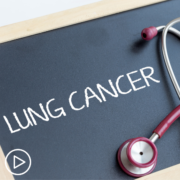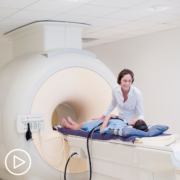How Can You Advocate for the Best Lung Cancer Care?
How Can You Advocate for the Best Lung Cancer Care? from Patient Empowerment Network on Vimeo.
What is the patient’s role in lung cancer care? Dr. Jessica Bauman discusses the importance of communication with your healthcare team as well as the benefits of taking advantage of supportive care options.
Dr. Jessica Bauman is assistant professor in the department of hematology/oncology and as associate program director of the hematology/oncology fellowship training program at Fox Chase Cancer Center in Philadelphia. Learn more about Dr. Bauman here.
See More From the The Pro-Active Lung Cancer Patient Toolkit
Related Programs:

|

What You Should Know When Making a Lung Cancer Treatment Decision |

Navigating Lung Cancer Treatment Decisions
|
Transcript:
Katherine:
Let’s talk about patient self-advocacy. Patients can sometimes feel like they’re bothering their healthcare team with their comments and questions. But why is it important for patients to speak up when it comes to their symptoms and their side effects?
Dr. Bauman:
So, this, I would say, it’s a partnership. The bottom line is, and if I don’t know that something is going on, I can’t help to solve the problem. And if I don’t know about something, a new symptom that could be, potentially, majorly concerning, patients can also get really sick or even end up in life-threatening situations. And so, ignoring things or just hoping things will go away is not in a patient’s best interest.
I think that it is critical that patients are their own self-advocate. I think that I say that often, and I’ve already said that a couple of times on this, but we don’t know unless we’re hearing from them what’s going on. And so, it is so important for patients to keep us updated if they’re worried about something. Certainly, we see them very frequently, and so they can often tell us at their visits what’s going on. But overall, the in-between time is just as critical because it is often the treatments that we give can cause side effects at any time. And so, it is really important that we know about anything that’s going on and for patients to always give us a call.
I mean, that’s the bottom line is, is that if they’re worried about something, we need to know about it.
Katherine:
What supportive care options are there for patients who may have pain management difficulties or even emotional support? Where do they start?
Dr. Bauman:
So, there are often many different kinds of supportive care for patients. I would say that oncologists, of course, are one layer of supportive care. We do a lot of help with symptom management and often even pain management as well as coping and emotional support. However, there are also other people often within cancer centers that are also available to help. And this includes social workers. It also includes psychologists and psychiatrists.
And then the other thing that I think is really important to mention is that we know for patients who have lung cancer or an advanced lung cancer diagnosis, that integrating a palliative care team – a supportive and palliative care team – early into their diagnosis actually helps them live longer as well as better.
They have better quality of life, and they have decreased problems with mood.
And so, we know that supportive care and palliative care, specifically in lung cancer, is particularly helpful for both patients and their caregivers. And so, it’s important for patients to also know that there is a whole team, that I think of as, sort of, an extra layer of support, that can help them with symptom management as well as with coping with the day-to-day of what can be a devastating diagnosis.










